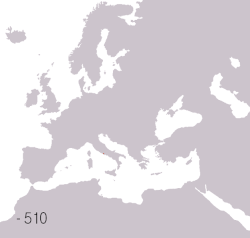Military of ancient Rome
The Military of ancient Rome Portal
The Military of ancient Rome relates to the combined military forces of Ancient Rome from the founding of the city of Rome in the 8th century BC to the fall of the Western Roman Empire in the 5th century AD. Originally The Roman military consisted entirely of the Roman army, but a small navy was first added during the Samnite Wars and later significantly expanded. The Roman military was intertwined with the Roman state much more closely than in a modern Western nation. Josephus describes the Roman people as "as if born ready armed." and the Romans were for long periods prepared to engage in almost continuous warfare.For a large part of Rome's history, the Roman state existed as an entity almost solely to support and finance the Roman military. The military's campaign history stretched over 1300 years and saw Roman armies campaigning as far East as Parthia, as far south as Africa and as far north as Britannia.
The makeup of the Roman military changed substantially over its history, from its early history as an unsalaried citizen militia to a later professional force. The equipment used by the military altered greatly in type over time with the Romans adapting to circumstance and showing a willingness to utilise the technology of their enemies, though there were very few technological improvements in weapons manufacture, like the rest of the classical world. For much of its history, the majority of Rome's forces were maintained at or beyond the limits of its territory, in order to either expand Rome's domain, or protect its existing borders.
article

elected biography

Quotes
- Roman, remember that you shall rule the nations by your authority, for this is to be your skill, to make peace the custom, to spare the conquered, and to wage war until the haughty are brought low., Virgil, Aeneid
- Alea iacta est (The die is cast), reportedly said by Gaius Julius Caesar before crossing the Rubicon
- Silent enim leges inter arma (Laws are silent in times of war), Cicero
- War gives the right of the conquerors to impose any conditions they please upon the vanquished. , Gaius Julius Caesar
- The outcome corresponds less to expectations in war than in any other case whatsoever, Livy
- A bad peace is even worse than war. , Tacitus
- Veni, Vidi, Vici (I came, I saw, I conquered), Gaius Julius Caesar
- I found Rome brick, I left it marble., Caesar Augustus
 Data Science Ar
Data Science Ar

0 comments:
Post a Comment